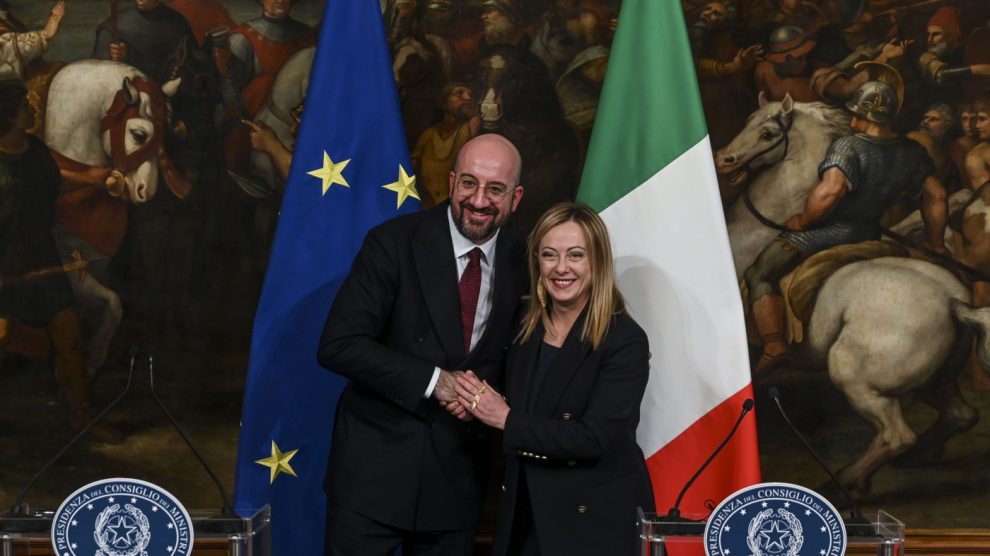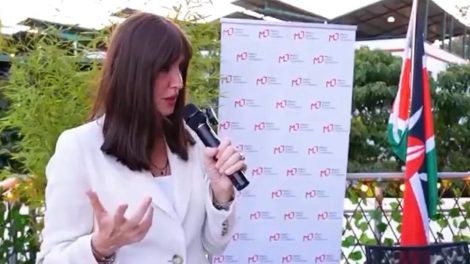The Meloni-Michel meeting. On Monday, the Italian Prime Minister met with the President of the European Council, who flew to Rome in time for lunch. “Working together to make Europe safer, stronger, and more prosperous,” tweeted Charles Michel, who thanked and spoke appreciatively of PM Meloni’s frankness and sincerity in the ensuing presser.
- PM Meloni called on the EU to exert caution when relaxing its rules on state aid – and “have the courage” to create a sovereign investment fund, though getting 27 States to agree won’t be easy.
- That’s in reference to the EU’s answer to the United States’ cleantech subsidies (earmarked under the Inflation Reduction Act). Rome has been calling to complement Washington’s strategy with a parallel plan while avoiding distortions in the single market.
- She also voiced the need for “structural answers” on the migration issue, “starting with the defence of the Union’s borders,” and EU-wide unity in working towards a shared solution.
- “There must be awareness that Italy cannot tackle this issue alone, which is linked, especially today, to security. The commitment towards Africa must be of the whole Union,” she commented.
The international agenda. This week, PM Meloni is slated to travel to Stockholm and Berlin. There are also talks of her visiting Paris before the European Council summit on February 9-10, where EU leaders will discuss the IRA and the EU’s response.
- This heightened diplomatic activism follows a comprehensive MENA tour (with a focus on energy, migration and Mediterranean security) and indicates the government’s push to bring its most pressing dossiers abroad.
Migration matters. Her intention, as she detailed it on Sunday evening on her social media channels, is “convincing major nations to help us on the central Mediterranean [migration] route to move forward. Some have been made; others must be made.”
- These steps, she added, must be corroborated by “Italy’s ability to have bilateral relations and contacts, presence, in Northern Africa,” also to repatriate those who are not granted access and create development “so that people do not have to flee their homes.”
- Last week, Interior Minister Matteo Piantedosi detailed Rome’s proposed solution to the migration issue.
Energy weekend. As we anticipated, the PM travelled to Tripoli and met with her counterpart, Abdelhamid Dabaiba. The most visible result was the $8 billion gas deal that Italy’s energy major Eni signed with Libya’s National Oil Corporation (NOC), granting Rome the right to extract gas from offshore Libyan fields and building a carbon capture and storage facility at the jointly-owned Mellitah Complex.
- This is part of a wider strategy the government is calling the Mattei Plan, which aims to project Italy in the enlarged Mediterranean through policies encompassing energy and migration agreements as well as commercial ties.
- The basic idea is to bolster political and economic cooperation, with Northern African capitals obtaining preferential funds, industry contacts and know-how to bolster their own economies and Rome gaining access to fossil fuels today – and clean energy tomorrow – as it aids the energy transition process.
100-day health check. Ms Meloni’s rightwing government performed beyond expectations in its first period. Internally, nearly half of Italians approve of her actions (48%, whereas those who voted for her party in September were 26%), which makes her the EU’s most respected leader.
- The government also garnered international attention and praise for its unflinching pro-Ukraine and Western stances, as well as Ms Meloni ditching her past Euroscepticism and largely cooperating with European institutions.
- Markets appreciated this: the spread between German and Italian 10-year bonds, a closely-watched indicator of Rome’s ability to pay off its public debt, decreased from over 2.3% to less than 1.8% since the PM took office.
In Meloni’s own words: “The balance of this work, which is a marathon and not 100 metres, I want to draw at the end. I can say that I am optimistic,” she said on Sunday evening. “Italy is in a more solid situation than some would have us believe,” she added, pointing at the spread data, the 20% increase in Milan’s stock market and the Bank of Italy’s promising 2023 outlook.





